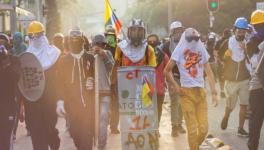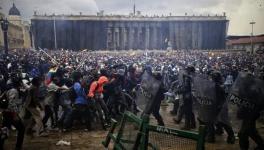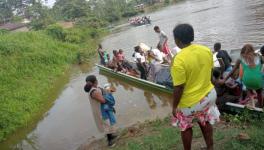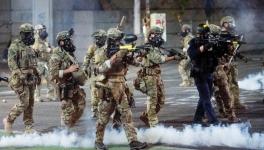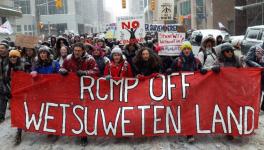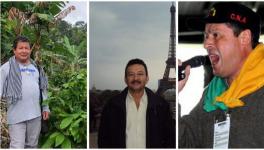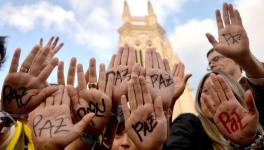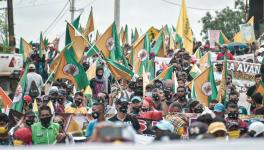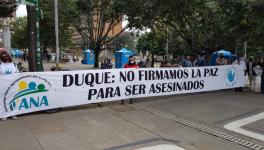A Wave of Massacres Shakes Colombia
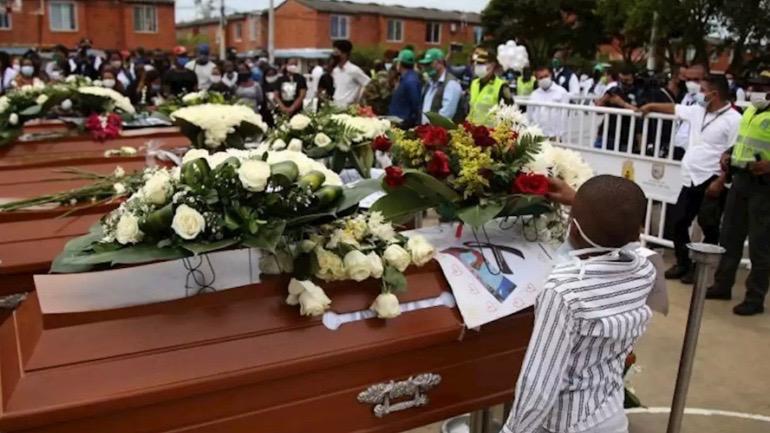
More than 40 people have been assassinated in the past two days in 8 massacres in different departments of Colombia. Photo: Contagio Radio
Colombia has been shaken by a wave of massacres in recent days. At least 20 people were murdered in 4 massacres in different departments of the country between August 20 and 23. The latest massacre that took place on August 23 was the fifth perpetrated in the country in the last week and the eighth in the last two weeks. According to the office of the United Nations High Commissioner for Human Rights, 33 massacres were registered in Colombia till August 16 of this year.
However, Colombian president Iván Duque has attempted to diminish the gravity of the situation. On August 22, during his short visits to the city of Cali in the Valle de Cauca department, where five minors were shot dead on August 11 and to the municipality of Samaniego in the Nariño department, where eight people were killed on August 15, he said that the recent massacres in the country are not “massacres” but “collective homicides”, undermining the seriousness of the humanitarian crisis facing the country.
“In our government, which has been in power for two years, these events have also been registered. 37 ‘collective homicides’ have been registered, equivalent to 2% of the ‘collective homicides’ in the last 22 years,” said Duque.
The latest
In the afternoon of August 23, three people were assassinated by a group of armed men in the Los Álamos neighborhood, in the municipality of Venecia, in the department of Antioquia. The mayor of Venecia, Óscar Andrés Sánchez, confirmed the news.
Earlier, on the night of August 21, armed men killed six people in the town of La Guayacana, in the Tumaco municipality, in the department of Nariño. The governor of Nariño, Jhon Rojas, confirmed the violent incident on the morning of the following day. It was the third massacre in the department since August 10.
The same day, hours before the massacre in Tumaco, six other people were murdered in another massacre in the rural area of the Uribe district, in the El Tambo municipality, in the Cauca department. The event was verified by the mayor of that municipality, Carlos Vela.
A day before, on August 20, five dead bodies were found in the El Caracol village, in the Arauca municipality, in the department of the same name. In the afternoon of August 21, the Ombudsman’s Office confirmed the discovery of dead bodies.
The departments of Cauca and Nariño are two of the most affected regions by the violence, due to the large presence of drug traffickers and paramilitaries in these areas, who are fighting over the control of land and natural resources and drug trafficking routes. Environmentalists, land defenders and social leaders, who raise awareness to the problems of their communities and fight for their rights, are primarily targeted.
The situation of violence, which was supposed to improve after the signing of peace agreements between the Colombian government and the guerilla group Revolutionary Armed Forces of Colombia (FARC), has worsened after their disarmament. There is a significant expansion of paramilitary groups in the areas where the FARC had control previously. Additionally, the former combatants of the FARC and their family members, who are in the reincorporation process, have been constantly attacked by the right-wing paramilitaries. Up until today, over 200 ex-combatants and their family members have been assassinated.
The Common Alternative Revolutionary Forces (FARC) political party and several social organizations have denounced the national government of President Iván Duque numerous times for its lack of will to implement measures to stop these aggressions as well as to dismantle the paramilitary structures.
Alberto Yepes, the coordinator of the Human Rights and IHL Observatory of Coeuropa, explained that the paramilitarism is not fought by the government because it fears that the leaders of these groups will reveal the names of those who are actually behind these structures and sponsor them economically and politically.
“There is a terrible panic among the elites that the paramilitary leaders can tell the truth they know about who the architects, funders, organizers were and benefited from all the dispossession brought by paramilitary terror,” said Yepes in an interview with Contagio Radio.
According to the data collected by the Institute of Development and Peace Studies (INDEPAZ), between January 1 and August 18, 2020, 194 environmentalists, human rights defenders, Indigenous, peasant and social leaders, and more than 40 ex-combatants of the FARC were killed.
Courtesy: Peoples Dispatch
Get the latest reports & analysis with people's perspective on Protests, movements & deep analytical videos, discussions of the current affairs in your Telegram app. Subscribe to NewsClick's Telegram channel & get Real-Time updates on stories, as they get published on our website.










